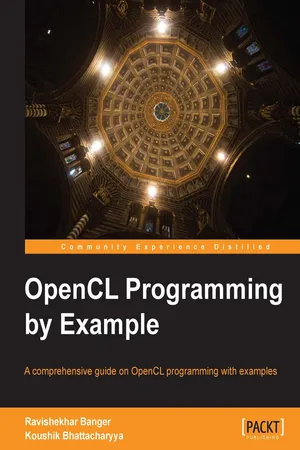
- 304 pages
- English
- ePUB (mobile friendly)
- Available on iOS & Android
OpenCL Programming by Example
About this book
In Detail
Research in parallel programming has been a mainstream topic for a decade, and will continue to be so for many decades to come. Many parallel programming standards and frameworks exist, but only take into account one type of hardware architecture. Today computing platforms come with many heterogeneous devices. OpenCL provides royalty free standard to program heterogeneous hardware.
This guide offers you a compact coverage of all the major topics of OpenCL programming. It explains optimization techniques and strategies in-depth, using illustrative examples and also provides case studies from diverse fields. Beginners and advanced application developers will find this book very useful.
Beginning with the discussion of the OpenCL models, this book explores their architectural view, programming interfaces and primitives. It slowly demystifies the process of identifying the data and task parallelism in diverse algorithms.
It presents examples from different domains to show how the problems within different domains can be solved more efficiently using OpenCL. You will learn about parallel sorting, histogram generation, JPEG compression, linear and parabolic regression and k-nearest neighborhood, a clustering algorithm in pattern recognition. Following on from this, optimization strategies are explained with matrix multiplication examples. You will also learn how to do an interoperation of OpenGL and OpenCL.
"OpenCL Programming by Example" explains OpenCL in the simplest possible language, which beginners will find it easy to understand. Developers and programmers from different domains who want to achieve acceleration for their applications will find this book very useful.
Approach
This book follows an example-driven, simplified, and practical approach to using OpenCL for general purpose GPU programming.
Who this book is for
If you are a beginner in parallel programming and would like to quickly accelerate your algorithms using OpenCL, this book is perfect for you! You will find the diverse topics and case studies in this book interesting and informative. You will only require a good knowledge of C programming for this book, and an understanding of parallel implementations will be useful, but not necessary.
Tools to learn more effectively

Saving Books

Keyword Search

Annotating Text

Listen to it instead
Information
OpenCL Programming by Example
Table of Contents
OpenCL Programming by Example
Table of contents
- OpenCL Programming by Example
Frequently asked questions
- Essential is ideal for learners and professionals who enjoy exploring a wide range of subjects. Access the Essential Library with 800,000+ trusted titles and best-sellers across business, personal growth, and the humanities. Includes unlimited reading time and Standard Read Aloud voice.
- Complete: Perfect for advanced learners and researchers needing full, unrestricted access. Unlock 1.4M+ books across hundreds of subjects, including academic and specialized titles. The Complete Plan also includes advanced features like Premium Read Aloud and Research Assistant.
Please note we cannot support devices running on iOS 13 and Android 7 or earlier. Learn more about using the app